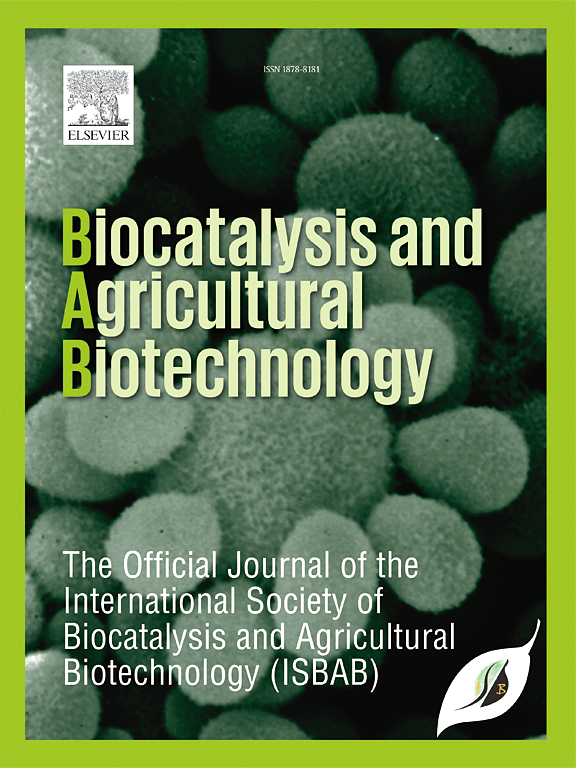Sustainable management strategy for converting poultry feather waste into valuable organic fertilizer: Improving the growth of Dalbergia sissoo using feather-based compost
IF 3.4
Q2 BIOTECHNOLOGY & APPLIED MICROBIOLOGY
引用次数: 0
Abstract
Sustainable agriculture faces challenges in managing agro-industrial biomass waste, particularly poultry feathers. Proper management of this naturally occurring, biodegradable raw organic waste can help improve soil fertility, promote plant growth, and reduce environmental stresses. This study was conducted at the Faculty of Agriculture, Cairo University, Egypt, to assess the efficacy of using various types of animal feces in the preparation of poultry feather-based composts, the quality of the prepared composts, and their potential effectiveness in improving the growth performance and chemical components of a medicinal leguminous tree (Dalbergia sissoo Roxb.) without compromising the environment. The results demonstrate that all feather-based composts enriched with animal feces had appropriate pH and C:N ratios, high concentrations of ash and NPK, and low concentrations of organic matter and total organic carbon when compared to feather compost without animal feces. Seedlings supplied with feces-enriched composts showed comparable growth and leaf content of photosynthetic pigments, total carbohydrates, amino acids, phenols, and flavonoids, as well as antioxidant activity, to those supplied with synthetic NPK fertilizers (control). The superior performance was obtained by compost prepared using fish culture sludge, followed by broiler chicken excreta, then the feces mixture, sheep dung, cow dung, and compost prepared without feces. Our study presents a sustainable nutrient recycling strategy based on the efficient and cost-effective conversion of poultry feather waste into an eco-friendly organic fertilizer (compost) for the fertilization of an economical medicinal tree species with broad ecological and landscape benefits in poor soils.

将家禽羽毛废物转化为有价值的有机肥料的可持续管理策略:利用羽毛为基础的堆肥促进黄檀的生长
可持续农业在管理农业工业生物质废物,特别是家禽羽毛方面面临挑战。妥善管理这种自然产生的、可生物降解的原始有机废物有助于提高土壤肥力,促进植物生长,减少环境压力。本研究是在埃及开罗大学农学院进行的,旨在评估使用不同类型的动物粪便制备家禽羽毛堆肥的功效、所制备的堆肥的质量,以及它们在不损害环境的情况下改善药用豆科树(Dalbergia sissoo Roxb.)生长性能和化学成分的潜在有效性。结果表明,与不添加动物粪便的羽毛堆肥相比,添加动物粪便的羽毛堆肥具有适宜的pH和C:N比,较高的灰分和氮磷钾浓度,较低的有机质和总有机碳浓度。施用富粪堆肥的幼苗在生长和叶片光合色素、总碳水化合物、氨基酸、酚类和类黄酮含量以及抗氧化活性方面与施用合成氮磷钾肥料(对照)的幼苗相当。以养鱼污泥为原料制备的堆肥性能最优,其次是肉鸡粪便,然后是粪便混合物、羊粪、牛粪和无粪堆肥。我们的研究提出了一种可持续的养分回收策略,该策略基于将家禽羽毛废物高效且经济地转化为环保有机肥料(堆肥),用于在贫瘠土壤中具有广泛生态和景观效益的经济药用树种的施肥。
本文章由计算机程序翻译,如有差异,请以英文原文为准。
求助全文
约1分钟内获得全文
求助全文
来源期刊

Biocatalysis and agricultural biotechnology
Agricultural and Biological Sciences-Agronomy and Crop Science
CiteScore
7.70
自引率
2.50%
发文量
308
审稿时长
48 days
期刊介绍:
Biocatalysis and Agricultural Biotechnology is the official journal of the International Society of Biocatalysis and Agricultural Biotechnology (ISBAB). The journal publishes high quality articles especially in the science and technology of biocatalysis, bioprocesses, agricultural biotechnology, biomedical biotechnology, and, if appropriate, from other related areas of biotechnology. The journal will publish peer-reviewed basic and applied research papers, authoritative reviews, and feature articles. The scope of the journal encompasses the research, industrial, and commercial aspects of biotechnology, including the areas of: biocatalysis; bioprocesses; food and agriculture; genetic engineering; molecular biology; healthcare and pharmaceuticals; biofuels; genomics; nanotechnology; environment and biodiversity; and bioremediation.
 求助内容:
求助内容: 应助结果提醒方式:
应助结果提醒方式:


